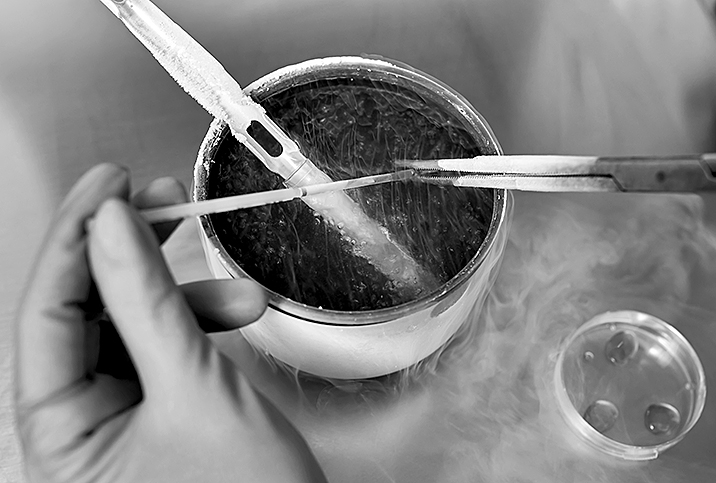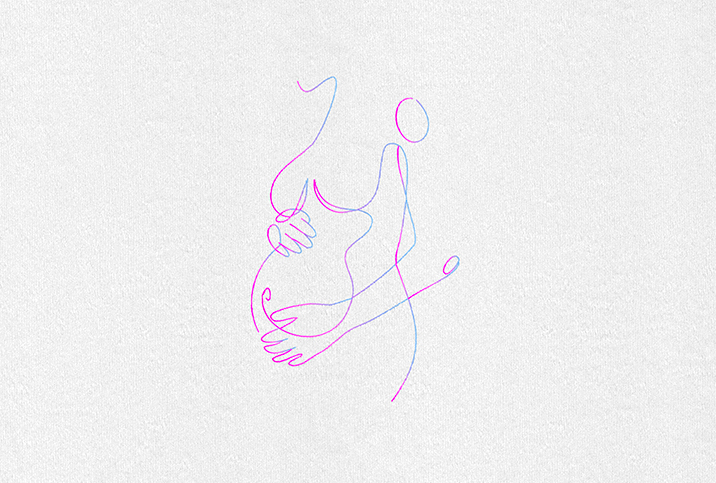What Women In Their 20s Should Know About Their Reproductive Timeline

A woman's age plays a significant role in her ability to become pregnant. As we age and fertility naturally declines, getting pregnant becomes all the more challenging. Usually, by age 40, there's approximately a 4 percent chance of conceiving naturally each month.
Delaying parenthood is common nowadays, with more women waiting until their 30s to begin a family. Recently, I had a conversation with my best friend about delaying parenthood and deciding against motherhood altogether. At 25, this was the first time I ever thoroughly considered my fertility and the number of options I would have if I changed my mind about having children later on down the line.
Although we have science on our side with egg freezing treatments, these procedures can be costly, and not everyone will have the means or opportunity to pursue this option. Whether you choose to delay motherhood or are still weighing your options, there are benefits to considering your fertility sooner rather than later.
Fertility as we age
Unlike men, who produce sperm all of their life, women are born with a set amount of eggs in their ovaries from birth. There are about one million egg follicles present at birth, and that number greatly decreases to around 300,000 by puberty. Throughout a woman's reproductive life span, only 300 to 400 will be ovulated. Despite the number of eggs we have at puberty, most of them are lost through an ongoing process called atresia. This denaturation gradually happens to the egg follicles that don't go through the ovulation process over time.
According to Kate White, M.D., M.P.H., associate professor of obstetrics and gynecology at the Boston University School of Medicine, for natural fertility to occur, three things are necessary for women:
- Ovaries that release eggs (ovulate) regularly
- Fallopian tubes that are unscarred to allow fertilization to take place
- A healthy uterine lining to allow implantation of a fertilized egg
As women get older, the ability to bear children naturally becomes more difficult. Age directly correlates with the decline in egg quality and quantity throughout the reproductive years.
Jordan Rush, M.D., an OB-GYN at Northside Women's Specialists in Atlanta, confirmed "as the eggs get older, the quality of the older eggs [decreases]. They are more likely to have mistakes in their chromosomes because of a process called nondisjunction, leading to abnormalities in chromosomes and poor quality with age."
The amount of genetically abnormal eggs begins to rapidly increase between the ages of 35 and 40. Women will have around 60 percent abnormal eggs between 35 and 40, but that number will jump considerably, to as high as 80 percent to 90 percent by their early 40s.
Besides egg quality abnormalities, changes in ovary function, the menstrual cycle and atresia are also responsible for fertility changes throughout the reproductive life span. The biological clock ticks on and loss of fertility is inevitable.
In this exclusive interview with Giddy, 'Real Housewives of Orange County' alum Gretchen Rossi stresses the importance of prioritizing fertility—and freezing your eggs—in your 20s. Watch the full interview here.
The optimal reproductive years
Women (with no underlying health issues) attempting to become pregnant in their 20s have about a 25 percent chance of conception every month and between a 40 percent to 60 percent chance of pregnancy within the first three months of trying.
Our natural fertility begins to decline in our 30s. At age 30, women have about a 20 percent chance of pregnancy every month. According to Rush, "The decrease in overall fertility starts, on average, as early as age 32 and declines more rapidly beginning at age 35. At 37, it decreases exponentially." By 40, it drops to as low as a 5 percent chance every month and continues to decrease until the beginning stages of menopause.
The average age of menopause is 51; however, women will experience age-related fertility issues before this occurs. As we get older, the threat of miscarriages, "conditions such as endometriosis, tubal damage from infection, and uterine fibroids become more frequently encountered, which increase difficulty [in] conceiving and can complicate pregnancy if it occurs," said Rush. It's important to note that even fertility treatments, such as in vitro fertilization (IVF), are dependent on our egg quality and quantity. Although some older women can successfully become pregnant through this method, the success rate decreases significantly as women age.
Planning for the future
Although our 20s are the optimal time for our eggs, not all of us will be ready to be mothers at this point. Menopause occurs at different times for everyone, so you never really know how many years you have left on your reproductive biological clock. With the potential for fertility decline to happen as early as 32, considering your fertility in your 30s could be too late.
Being proactive about your fertility sooner will help aid in your pregnancy journey later on. When approaching your doctor about gathering more information on your fertility, be honest about your concerns. Using your past medical and family history, your doctor can help devise a reproductive life plan, a beneficial way to find successful strategies for fertility and family planning.
Being proactive about your fertility sooner will help aid in your pregnancy journey later on.
Women can gauge their fertility status in a few ways. Blood tests, such as the anti-mullerian hormone (AMH) test, can offer important information on your fertility. AMH is a hormone present in the follicles that surround each egg. The blood is tested to gauge the level of this hormone, which is used to estimate the number of follicles a woman has. More follicles mean more eggs—and a better chance of pregnancy.
Other blood tests to gain information on your fertility include a follicle-stimulating hormone (FSH) test. FSH helps control our menstrual cycle and stimulates the growth of eggs in the ovaries. Too much or too little FSH can cause infertility and other health problems. This test is most commonly used for determining the cause of infertility or a potential ovarian problem.
Another way to test is through receiving an antral follicle count. A doctor performs a transvaginal ultrasound as a way to measure a woman's visible antral follicles and microscopical, primordial follicles. An immature egg is contained in each primordial follicle, and can give your doctor an idea of your fertility potential down the line.
Prevention over preservation is key
There is no medical way to guarantee the preservation or improvement of your fertility as it stands currently. But there are preventive measures you can take to help maintain fertility over time.
Annual visits
Routinely seeing your gynecologist is extremely important in maintaining your reproductive health. These visits are imperative as they help "prevent infections that could hurt your fertility and detect any health conditions that can affect getting pregnant down the line," said White.
Safe sex
In addition to your annual checkup, routine STI screening should be conducted as well. According to Mary Jane Minkin, M.D., FACOG, and Yale Medicine affiliate, some STIs, such as gonorrhea and chlamydia, can cause pelvic inflammatory disease (PID), which can lead to infertility. Practice safe sex by using condoms and getting tested with each new partner.
Lifestyle
Keeping our bodies healthy can help maintain our fertility. Exercising, eating a nutritious diet and maintaining a healthy weight can have a substantially positive impact on fertility. "Substances like alcohol, smoking and caffeine should be eliminated sooner than later," said Minkin, as they can cause ovulation problems and other fertility issues.
For women without health insurance or the means to get to a doctor, fertility tests and regular health screenings may not be viable options. Practical measures such as safe sex and lifestyle adjustments can help. Additionally, look into nonprofit organizations that offer reduced-fee gynecology appointments. Any measures you can take to stay on top of your reproductive health are beneficial.
As we get older, there are few factors about our fertility that we can control. Until there are more breakthroughs in current research on delaying egg aging, prevention is essential. Whether children are in your future or you just want to keep the option open, thinking about your fertility in your 20s can prepare your body for when you're finally ready to take that next step.


















